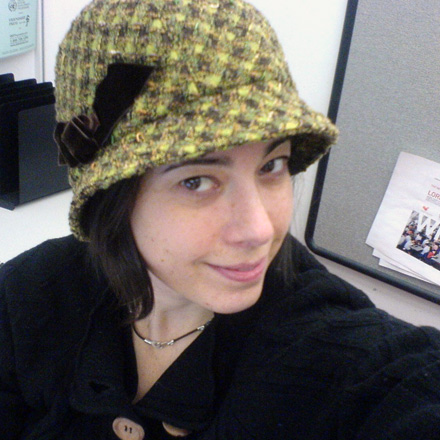 Tweet
Tweet
Featured on Jan 11, 2011
Kio Stark
"Cities are machines that produce interactions among strangers."
Bio:
I write fiction--my first novel, called Follow Me Down, will be out in June 2011. I also teach geeks about things like stranger interactions, intimacy and technology, and technological authenticity at NYU's Interactive Telecommunications Program. Sometimes I work in interactive advertising. I always talk to strangers.
- Title: Writer, Teacher
- Location: Brooklyn
- Contact: @kiostark, kiostark.com
The Interactive Telecommunications Program is a combination of many disciplines with a mission to “explore the imaginative use of communications technologies.” Is it difficult to describe the program to different people from wildly differing backgrounds?
It’s not difficult, but there’s no way to do it in one sentence. I usually start by saying it’s a graduate program for geeks, hackers, inventors and artists, and the inevitable response, after “wow,” is: “what do they learn?” Basically, they spend two years learning how to make, break and remake all kinds of technology, from the arcane to the recently possible. My classes aren’t about learning tech skills—I focus on shaping a deeper, more rigorous understanding of the people my students are making things for.
You document many aspects of your life through various media on the web, do you ever look back at your writings and photos to try to create something new/different from your own personal Internet history?
Follow Me Down, the novel I’ve got coming out in June, borrows from my Municipal Archive blog, which is about interactions I have with strangers. I was experimenting with stringing a series of the vignettes together to make a short story, and what I ended up with felt like the overture to a larger narrative, a coherent place with some tantalizing loose ends and a distinct mood. So, I changed the “I” character from those anecdotes into someone else, a woman named Lucy, who gets a letter that’s decades old, intended for an address around the corner. She goes to drop it off, and finds only a vacant lot. So she’s got this sealed mystery in her hands, and instead of taking it back to the post office, she opens it.
There’s an excerpt here.
The ITP Winter Show was just last month, can you tell us about some of your favorite projects from the show?
There’s always so much good stuff—wearables, mobile/social applications, video work, data visualizations, musical devices, games, and just plain gadgets. I’m always excited about work that involves the body in some way. I loved the “Heart on My Sleeve” project that Sofy Yuditskaya made, which is a beautiful piece of cloth worn on the wrist that senses your heartbeats and translates them into music that anyone else nearby can pick up. There was also Chris Alden’s REMI (Rhizomatic Experimental Musical Interface), a networked musical organism that lets the player improvise and collaborate musically with a machine. Here’s a list of all the projects.
You talk to strangers and then later blog about the experience. We’re curious, have you noticed any patterns with who is more willing to open up versus being guarded and suspicious of your intentions?
I want to give you a very nuanced, carefully observed answer to that question, but the truth is too simple: everyone talks to me. Everyone tells me their secrets.
In general, if you’re relaxed, look people in the eye, have a good sense of personal distance and an open face, people will talk to you. If you seem like you have an agenda or you’ve got any kind of nervous energy, they won’t. You have to make sure it’s always possible for the other person to leave the interaction. That’s called giving them ‘leavetaking rights.’ You do this with body language mostly, and by being attentive to their nonverbal cues.